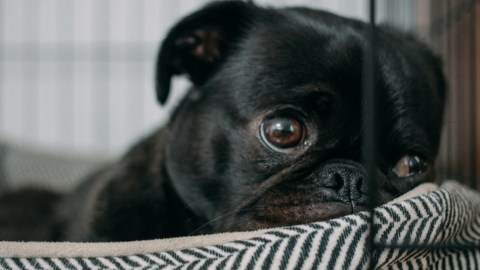Preparing your pet for the end of quarantine

Image source: Charles Diluvio/Unsplash
- It’s great we’re getting to enjoy so much more time with our animals, but we may be setting them up for heartbreak.
- Dogs and, yes, even cats may experience separation anxiety when we finally leave our homes at the end of lockdown.
- Best Friends Animal Sanctuary has some suggestions for preparing our pets for that transition one day.
The good thing about quarantine is that it forces us to spend more quality time with our loved ones. That includes our pets, who must be wondering why we never leave anymore. Still, all the extra contact, affection, and cuddling are probably making our pets happier than ever.
One day, though, this will come to an end, and something resembling normal will reassert itself. Off we’ll go back to our jobs, leaving our sweet companions to wonder where everyone went.
Dog behavior specialist Janelle Metiva notes, “Most pets don’t like sudden and abrupt changes. Instead, try starting now to get your pet ready and ease them back to your previously ‘normal’ routine more easily.”
Metiva works for Best Friends Animal Sanctuary, which has put together some advice on how to prepare our pets for the inevitable separation anxiety that will one day, someday, surely come. It’s something to think about now, before our lockdowns end.
We’ll have to work out our own separation anxiety.

Image source: BoulderPhoto/Shutterstock
What would this separation anxiety look like?
Telltale signs of separation anxiety might be:
- Unwarranted barking, howling, or whining, particularly for longer than 30 seconds, when you leave
- Scratching or chewing at entrances and exits, including doors and windows
- Destructive behavior when the pet is left alone
- Over-grooming or other self-harm or obsessive behaviors
- A change in appetite.

Image source: Best Friends Animal Sanctuary
Advice for dog owners
If only the average person were as nice as the average dog. Sigh. In any event, Metiva suggests a handful of things you can do top prepare your soft-hearted bud for your departure.
- Create a safe, comfortable place where they can have peaceful, relaxing alone time. This could be a crate or a separate room. Just make sure it’s in the quietest part of the house.
- Provide them with enrichment that can be enjoyed independently, such as hidden treats in boxes, food puzzles, stuffed Kongs, etc.
- Play soothing music such as reggae, smooth jazz, or classical, or turn on stations like the BBC or NPR while you’re gone to keep them from being startled by outside noises. You can also try a white-noise machine.
- Reward your dog for calm, independent behavior (especially if they’re usually clingy). We tend to pay attention to dogs only when they’re active or even misbehaving. They should be rewarded for being calm and chill.
It’s also a good idea to practice when you go out on an errand or for exercise. If:
- your dog shows signs of panic, decrease the amount of time that you leave, even if for just a few seconds.
- your dog barks or paws at the door when you leave, come back only when they’re quiet.
- your dog has trouble being alone for even brief periods of time, consult a Certified Separation Anxiety Trainer (CSAT) who may be able to help via a virtual consultation.

Image source: Best Friends Animal Sanctuary
Advice for cat owners
We wouldn’t go so far as to say cats’ typical seeming indifference is an act, quite, but it can be misleading — and it’s exacerbated by their lack of facial expressions. They do care, and if they’re often not obvious in their affection, it’s no coincidence that they tend to somehow quietly always stay close by. We’re not telling most cat owners something they don’t already know here.
As Best Friends’ cat behavior specialist Samantha Bell puts it, “Despite stereotypes that say otherwise, many cats form very close bonds with their humans and can become quite stressed when apart.” In general, she says, “Practicing confidence-building activities and having an enriching environment can help prevent this.”
Bell suggests trying the following to help your feline adjust to your absence:
- Engage your cat with a wand toy, shown above, at least once a day. Allowing your cat the opportunity to hunt, catch and kill with an interactive toy will help build their confidence and strengthen their bond with you in the healthiest way possible.
- Ensure that whatever adjustments you’ve made to their routine while you’re home are sustainable when you go back to work. If you’ve started feeding your cats four times a day while you’re home, start cutting it back to what is doable when you’re not working from home.
- If you’re not already using them, introduce puzzle-feeders to your cat. Cats instinctively want to forage for their food and puzzle-feeders satisfy that instinct while providing fantastic enrichment during alone time.
- Cats feed off from people’s emotions. So, when it’s time to go back to work, making a big, sad, dramatic scene as you leave is only going to make them feel more stressed. A happy, light tone, and a little treat as you leave will keep their spirits up.
Addicted to love
More time with our pets is for many of us a real gift, an opportunity to shower them with all the attention we don’t normally have the time to bestow. We get as much out of it as they do. Love, however, also means caring about someone else’s welfare. A little extra thought now can help ensure that this period of closeness leaves our animals happier even after we’ve gone back to our usual daily nonsense.





